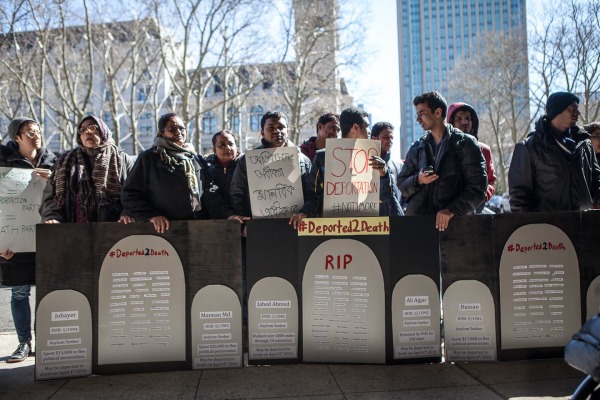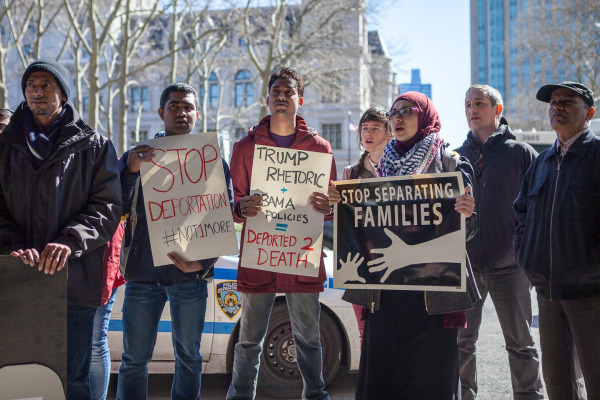Results 1 to 1 of 1
Thread Information
Users Browsing this Thread
There are currently 1 users browsing this thread. (0 members and 1 guests)
-
04-05-2016, 01:38 AM #1
 Advocates Concerned Bangladeshi Asylum Seekers May Be #Deported2Death
Advocates Concerned Bangladeshi Asylum Seekers May Be #Deported2Death
by FRANCES KAI-HWA WANG
Asian-American and Muslim-American advocates are speaking out against the possible deportation of 169 Bangladeshi political asylum seekers Monday, using the hashtag #Deported2Death to draw attention to the risk they face if they are returned to Bangladesh.
Fahd Ahmed, executive director of Desis Rising Up and Moving (DRUM) told NBC News that detainees have reported that over 500 South Asian migrants from Bangladesh, India, Nepal, and Pakistan, have been relocated to a detention center in Florence, Arizona, in preparation for mass deportations on Monday, April 4.

Desis Rising Up and Moving (DRUM) members outside presidential candidate Hillary Clinton’s
Brooklyn campaign headquarters March 29 demanding that Clinton speak out publicly to halt
the deportations of 169 Bangladeshi asylum seekers. Courtesy of Desis Rising Up and Moving
"I left Bangladesh and traveled across a dozen countries to escape political repression and save my life," Jahed Ahmed, an asylum seeker and DRUM member, said in a statement. "Instead, I ended up rotting away in detention for over 10 months. The U.S. government gave the names of many of the detainees to the Bangladeshi government, and they then leaked them to the media. Our asylum cases and hunger strikes have become a political issue for the Bangladeshi government, and now the Obama Administration wants to deport me back to where I will be disappeared, tortured or killed."
According to Fahd Ahmed, increasing numbers of Bangladeshis have fled political insecurity and religious persecution by traveling through South America to request asylum in the United States over the past several years. Once in the United States, Ahmed said they are detained and unable to properly prepare their asylum cases. Many of these asylum seekers also participated in the #FreedomGiving hunger strikes last fall.
Ahmed is also concerned that, due to racial and religious profiling, many of the asylum seekers have been incorrectly identified as "terrorists" for being members of the opposition party in Bangladesh. The asylum seekers and their families may have also been put at risk after U.S. Immigration and Customs Enforcement (ICE) allegedly gave the Bangladeshi government access to the asylum seekers and allowed their names to be published in Bangladeshi media.
"If they are sent back, they know they will end up in pieces on the side of the road," Ahmed said.

DRUM members protesting outside Hillary Clinton's Brooklyn campaign headquarters on
March 29. Courtesy of Desis Rising Up and Moving
Rep. Joe Crowley (D-NY), founder and chair of the Bangladesh caucus, sent a letter to Secretary of State John Kerry and Secretary of Homeland Security Jeh Johnson last week asking them to hold the deportations and examine any possible danger those deported could face.
Rep. Mike Honda (D-CA), immigration task force chair of the Congressional Asian Pacific American Caucus (CAPAC), and Rep. Judy Chu (D-CA), chair of CAPAC, also sent a letter to Johnson regarding the deportations.
"Given concerns surrounding their asylum proceedings, we strongly request that the deportations of these individuals be delayed by two months to allow for their cases to be reevaluated and allow their lawyers time to file motions to reopen and emergency stays of removal," the letter reads.
Several Asian-American and Muslim-American advocacy groups — including DRUM, MPower Change, #Not1More, and the Asian Pacific American Labor Alliance — have reached out to elected officials, the State Department, and the Department of Homeland Security, as well as to presidential candidates regarding the asylum seekers.

"Muslim and South Asian communities, and those perceived to be, are among those consistently subject to racial and religious profiling," Gregory Cendana, executive director of Asian Pacific American Labor Alliance, told NBC News. "The consequences have put many behind bars, deported and separated from their families, and even killed at the hands of state violence at disproportionate rates. We stand with these Bangladeshi detainees because their experiences show the impact of mass incarceration on communities of color and how Asian American and Pacific Islander communities are not immune to such criminalization."
Advocates Concerned Bangladeshi Asylum Seekers May Be #Deported2Death - NBC News
Similar Threads
-
Activists Warn Bangladeshi Asylum Seekers May Be Deported En Masse
By European Knight in forum illegal immigration News Stories & ReportsReplies: 0Last Post: 03-27-2016, 05:39 AM -
All “Asylum Seekers” in EU are Fake
By European Knight in forum illegal immigration News Stories & ReportsReplies: 0Last Post: 02-11-2016, 01:17 AM -
Asylum Seekers Detained
By Newmexican in forum illegal immigration News Stories & ReportsReplies: 1Last Post: 05-22-2015, 05:08 PM -
Advocates expect longer, more detention for asylum seekers
By Dixie in forum illegal immigration News Stories & ReportsReplies: 1Last Post: 12-02-2007, 12:31 PM -
Asylum seekers get chilly welcome in U.S.
By Brian503a in forum illegal immigration News Stories & ReportsReplies: 0Last Post: 06-21-2005, 02:04 AM


 LinkBack URL
LinkBack URL About LinkBacks
About LinkBacks




 Reply With Quote
Reply With Quote

"YOU WILL FOOT THE BILL FOR ILLEGAL IMMIGRANTS!" GOVERNOR HOCHUL...
04-23-2024, 05:46 AM in Videos about Illegal Immigration, refugee programs, globalism, & socialism